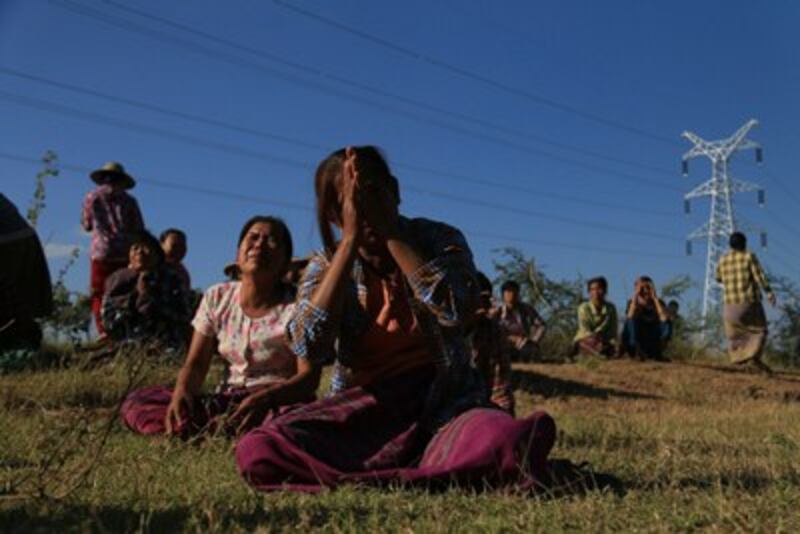Opposition party leader Aung San Suu Kyi on Wednesday said failure by authorities to implement the recommendations of a commission that reviewed a controversial copper mine project in northwestern Myanmar had led to a deadly clash at the site earlier this week between protesters and police.
A local official on Wednesday also announced a formal investigation into the violence at Letpadaung in Sagaing division, in which a woman was shot dead and around 20 people injured after police opened fire to disperse crowds protesting against the mine’s Chinese operator.
“It is something to question why they [authorities] didn’t implement the inquiry commission’s recommendations,” Aung San Suu Kyi, chairwoman of the National League for Democracy (NLD) party, told reporters.
“[The protest] erupted because they didn’t do what they had to do” to put into practice the recommendations, which called for more transparency in the project’s land appropriation process and for police riot control training in the wake of a violent raid on protesters at the mine site in 2012.
One villager, Khin Win, was shot dead and about 20 others, including police, were injured on Monday in the Letpadaung area when farmers tried to stop workers employed by China’s Myanmar Wanbao Mining Copper Ltd., the operator of the mine, from fencing off land the farmers said they had not been compensated for.
At least two other protesters were injured as the standoff continued Tuesday, with sources saying they had suffered bullet wounds after police again opened fire to drive back the crowd.
Nyan Win, a member of the NLD’s central executive committee, told RFA that authorities had failed to implement “several points” the commission had recommended regarding the mine project, including that police needed to receive better training on how to engage protesters.
“For example, we have laws for how to disperse a crowd and resolve riots, including a riot control manual [published] many years ago,” he said.
“According to this manual, police have to do it step by step. Now, a woman has died because of the way police dispersed the crowd.”

Investigation launched
Tha Aye, chief minister of Sagaing division, on Wednesday said he had formed a commission with the head of the local government and district police chief to complete a review of the clashes between farmers and police this week, according to Myint Naing of the NLD’s Sagaing division branch.
“He said that they would take action with transparency according to the report from that commission as soon as possible,” Myint Naing said Tha Aye had announced during a meeting between members of the NLD and Sagaing division government.
“He also said the process of putting up the fences had been completed, and the Sagaing division government would compensate Daw [honorific] Khin Win’s family for her death and help the injured people.”
China expressed regret on Wednesday for the death of Khin Win, after a postmortem examination confirmed that she had been killed by a police bullet to the head.
“We express our concern and regret over the injuries and death, and hope that the incident can be properly handled,” Chinese foreign ministry spokesperson Hua Chunying told a daily news briefing.
“The Chinese government always requires Chinese companies investing overseas to abide by local laws and regulations, honor their social responsibilities and obligations and focus on environmental protection.”
Inquiry commission
Villagers have been protesting against the Letpadaung project about the lack of fair compensation for their confiscated lands as well as environmental destruction and defilement of religious structures.
In March 2013, President Thein Sein formed a committee to implement the findings of an inquiry commission headed by Aung San Suu Kyi in the wake of a violent crackdown by authorities on protesters at the mine site five months earlier.
During the November 2012 raid on a protester camp at the site, police fired incendiary devices containing phosphorus to disperse the crowd, injuring more than 100 people.
The inquiry commission found that Wanbao had improperly compensated farmers for their land, and said the appropriation process had lacked transparency.
It also acknowledged the use of phosphorus devices by authorities and recommended police receive training on riot control techniques, faulting them for not understanding how to deploy smoke bombs during the raid, which was labeled as excessive by rights groups.
The 15 members of the committee formed to implement the inquiry commission’s recommendations include Union Minister Hla Tun as chairman, chief minister of Sagaing division Tha Aye, and Khin Zaw Oo, Wanbao’s managing director.
The final report of the parliamentary commission had advised a continuation of the project despite repeated demands by local residents to shut it down because of environmental damage and illegal land confiscations.
Reported by Kyaw Thu, Kyaw Zaw and Thin Thiri of RFA’s Myanmar Service. Translated by Khet Mar. Written in English by Roseanne Gerin.
